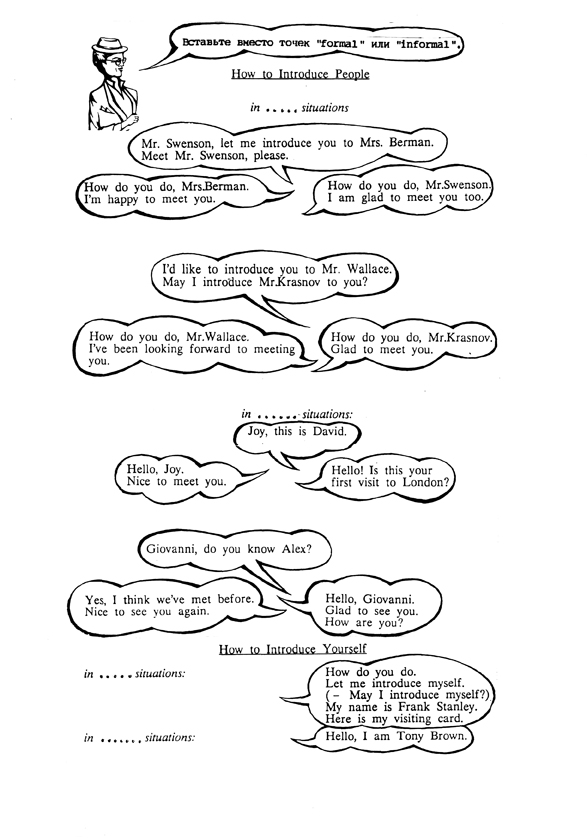
- •Предисловие
- •Introducing people
- •Dialogue 1
- •Страничка для начинающих
- •Грамматический комментарий
- •I am Russian. I am from Russia.
- •I was born in Moscow on May 1, 1972.
- •At the airport
- •Video Script
- •1. At the airport
- •2. On the phone
- •3. Outside Acme Bikes
- •4. In fg's office
- •5. In the reception area
- •6. At the party
- •In fg's office
- •In your own country
- •The Russian Federation.
- •The Russian Federation Nouns
- •Verbs and verb combinations
- •Adjectives
- •The State System of Russia
- •If it is true
- •If it is false
- •Role – play
- •The Kuzbass
- •The Kuzbass
- •Additional vocabulary
- •Comprehension check
- •Some facts from Kemerovo’s history.
- •Seeing the sights Dialogue 1
- •Asking the Way Dialogue 1
- •Dialogue 2
- •Dialogue 3
- •I don’t feel like staying in town for the summer.
- •Role-play
- •Listening
- •Peter: Why not? Andrew: Well, there were too many people, and there was too much noise. Peter: Oh, I love crowds and noise!
- •Listening
- •Our institute
- •Topical Vocabulary
- •Our Institute.
- •Academic Year and Evaluation
- •Classes
- •Facilities
- •Living conditions of students
- •Leisure time and medical care
- •Postgraduate courses
- •Employment
- •Role – play
- •Additional material for speaking
- •Приложение (Supplement) the tournament of merry and quick-witted
- •A Song about Student Life
- •Список литературы
- •650010, Г. Кемерово, ул. Красноармейская, 5
In fg's office
Which person insists that Henk should use her first name? Why?
Which person does not ask Henk to call him by his name? Why?
In your own country
How would people address each other in similar situations in your country?
Section 7 Decide when to say it
Where or when would you use these expressions?
How are they different?
(1) Excuse me. Are you Mr/Mrs/Miss Cowfold?
(2) Excuse me. I don't know your name.
(1) This is Harry Jones.
(2) Let me introduce you to Harry Jones.
(1) Hello. My name's John Smith.
(2) Hello. John Smith here.
(1) May I introduce myself? I'm ...
(2) Hello. I'm ...
(1) Goodbye, Mr/Mrs/ Miss Selby.
(2) 'Bye, darling.
(1) Pleased to meet you.
(2) The pleasure's mine.
Notes on the video script (*)
How do you do, Henk?
Extension seven five three.
'Bye. The pleasure's all mine.
Afternoon.
Very kind of you.
See you. Take care. |
It's rather unusual to use a first name with this formal introduction. In Britain it's common when answering the phone to give your phone number, or, in this case, your office extension number. an informal way of saying "Goodbye" This is Jane's personal way of responding to an introduction. More standard responses might be "Me too", or "Nice to meet you'". an informal greeting. If you leave out "Good" from any greeting, it makes it more informal. The standard response would be "It's/ That's very kind of you". "See you" is now accepted as a standard informal way of saying goodbye to someone you expect to see soon. "Take care", literally "Take care of yourself", is American English. |

The Russian Federation.
Ex. I. Practise the pronunciation of the following geographical names:
the Russian Federation [´rAS(q)n ,fedq´reIS(q)n]
Eastern Europe [´Jstqn ´juqrqp]
Northern Asia [´nLD(q)n ´eISq]
the Baltic Sea [´bLltIk ´sJ]
the Pacific Ocean [pq´sIfIk ´quS(q)n]
the Arctic Ocean [´RktIk ´quS(q)n]
the Black Sea [´blxk ´sJ]
the Caucasus [´kLkqsqs]
the Altai [xl´t(eI)aI]
the Sayan mountains [´seIqn ´mauntInz]
the Amur [x΄muq]
the Ussuri rivers [H´sH(q)rI]
Norway [´nLweI]
Finland [´fInlqnd]
Estonia [es ´tqunjq]
Latvia [´lxtvIq]
Belarus [,belq ´rus]
the Ukraine [jH´kreIn]
the Georgia [´GLGjq]
Azerbaijan [,xzqbaI´GRn]
Kazakhstan [,kRzqk´stRn]
Mongolia [mON´gqulIq]
China [´CaInq]
the Caspian Sea [´kxspIqn ´sJ]
Europe [´juqrqp]
the Urals [´juqr(q)lz]
the Baikal [baI´kRl]
Ex. II. Read the following international words and guess their meanings. Check the words in bold type in the dictionary:
N |
A |
V |
extreme confession resource agriculture laser legislature bill chronicle fortification transfer office industry institution function archives |
total ethnic orthodox urban mineral natural fundamental legislative constitutional regional commercial metropolitan original chemical
|
to occupy to vary to separate to represent to produce to balance to initiate to veto to lead
|
Topical Vocabulary
